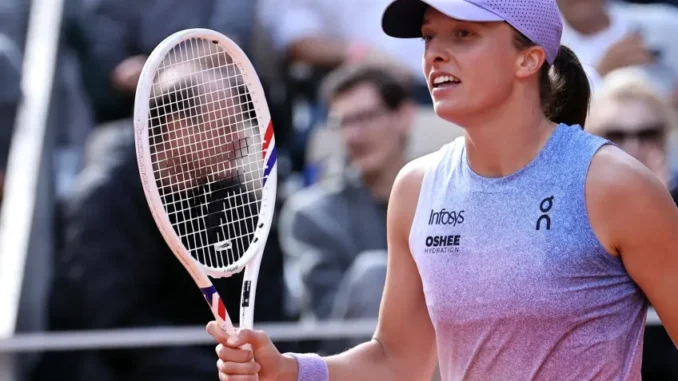
The 2025 French Open at Roland Garros has been a battleground not only for tennis supremacy but also for a heated debate over gender equality in scheduling, with defending champion Iga Swiatek emerging as a powerful voice in the controversy. The Polish star, a four-time Roland Garros winner, has shifted from her earlier indifference to boldly advocating for equal treatment in the tournament’s primetime night session slots, which have overwhelmingly favored men’s matches. After her commanding 6-2, 7-5 victory over Romania’s Jaqueline Cristian in the third round, Swiatek used the electric atmosphere of Court Suzanne Lenglen—complete with Mexican waves from the crowd—as proof that women’s tennis deserves the same spotlight as men’s. Her stance has ignited a broader conversation about fairness, representation, and the future of the sport.
Since the introduction of night sessions at Roland Garros in 2021, the scheduling disparity has been stark. Only four women’s singles matches have been featured in the primetime slot on Court Philippe-Chatrier, compared to 20 men’s matches, with none scheduled for women in the first six days of the 2025 tournament. This imbalance has drawn criticism from players like Ons Jabeur, who called the decisions “ironic” and argued, “Of course they watch men more because you show men more.” Swiatek, initially reserved on the issue, previously expressed a preference for daytime matches, saying, “I like playing day. So I’m happy I’m done and can have a longer rest.” However, her perspective evolved as she witnessed the vibrant fan response to her matches, prompting her to assert, “Women’s matches can be entertainment the same way. As you could see today on my match, they were doing the Mexican waves and everything. So people like it.”
The controversy intensified with comments from tournament director Amélie Mauresmo, a former world number one, who defended the scheduling by citing the shorter format of women’s matches—best of three sets versus men’s best of five—as less appealing for primetime audiences. “If we have two matches in the night session, it doesn’t work in terms of how late players are going to finish,” Mauresmo explained, adding that a single women’s match could end “really fast,” potentially leaving fans wanting more. This reasoning has been met with pushback, notably from Coco Gauff, who suggested earlier start times like 7:00 p.m. to accommodate women’s matches without risking late finishes. “I don’t think anyone wants to play after the 8:15 p.m. match,” Gauff noted, highlighting the recovery challenges of late-night play.
Swiatek’s call for equality resonates with the WTA’s push for balanced scheduling, with the organization stating, “The WTA encourages all combined tournaments to provide a balanced match schedule that showcases the best of both women’s and men’s tennis.” Her comments come at a pivotal moment, as she continues her quest for a historic fourth consecutive Roland Garros title. Having dispatched Emma Raducanu 6-1, 6-2 in the second round, Swiatek is set to face Elena Rybakina in a blockbuster fourth-round clash, a matchup that many, including Gauff’s former coach Brad Gilbert, argue would be “logical” for a night session. “Just seeing live score, Iga Pop rolled Emma, that seemed logical women’s night match,” Gilbert posted, though he acknowledged the risk of a quick match diminishing the session’s appeal.
The debate has sparked a firestorm among fans and players alike. Jabeur, a three-time Grand Slam finalist, took to social media to emphasize the women’s game’s “loud and brilliant” legacy, writing, “Honouring one side of the sport shouldn’t mean ignoring the other.” Swiatek, while maintaining her focus on the court—she humorously admitted, “I couldn’t play poker,” after joking about her relief at avoiding nemesis Jelena Ostapenko—has become a reluctant but resolute advocate. Her 24-match winning streak at Roland Garros and her status as a fan favorite make her a compelling voice in the push for change. As the tournament progresses, the pressure is on organizers to address the scheduling disparity, ensuring that stars like Swiatek, Gauff, and Aryna Sabalenka get the primetime stage their talent demands. For now, Swiatek’s blend of on-court dominance and off-court advocacy is rewriting the narrative at Roland Garros, one match at a time.
Leave a Reply